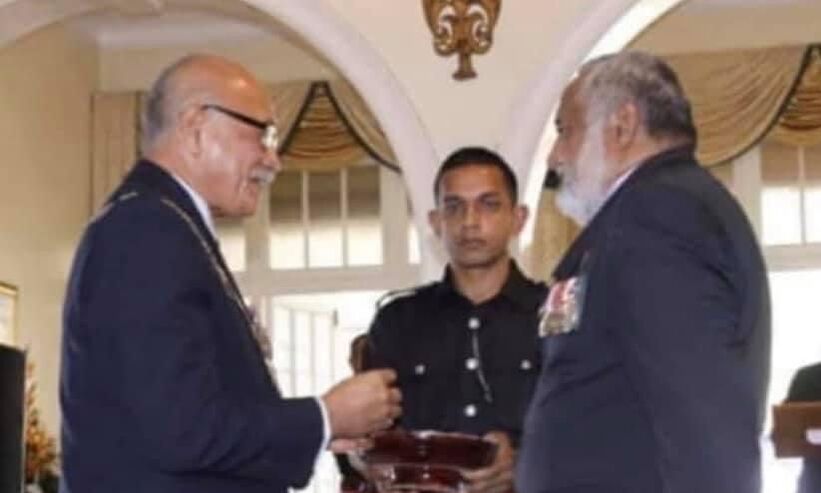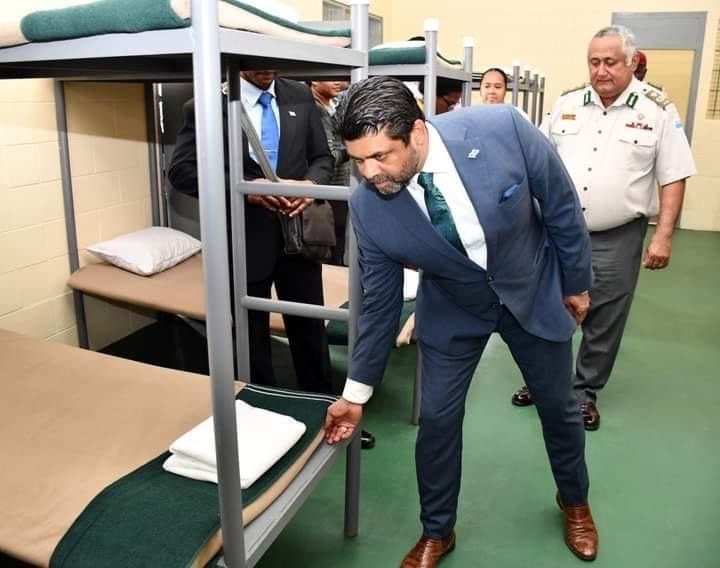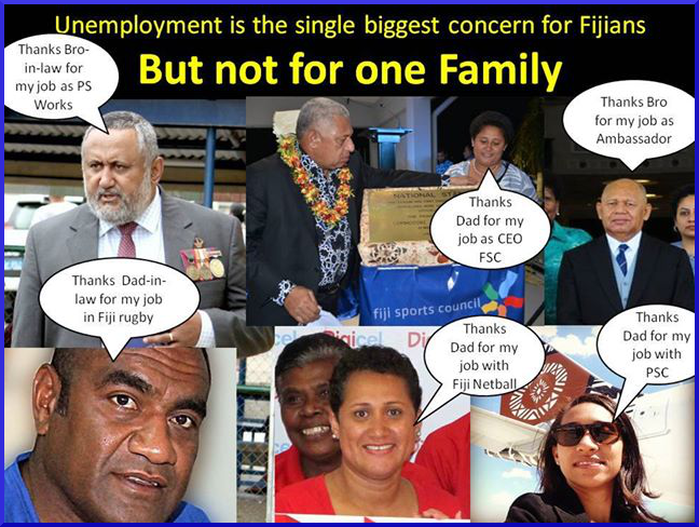GONE TOO SOON: Killer Kean robbed Mrs Whippy and family their beloved husband JOHN WHIPPY who did not live to celebrate HAPPY FIJI50 DAY. KEAN'S REWARD: FIJI DAY MEDAL: "The utter devastation to Mrs. Ana Whippy’s family and her grieving loss were simply described by her victim impact statement. Mr. Kean your assault took away the father of an eight-year old girl and six-year old boy. Your assault also took away a husband. It has left his widow heartbroken, restless and distressed by the worry of her future prospects.They are, however, not the only victims. Your assault undoubtedly also took away the happiest day in any young couple’s life. Their marriage will forever be remembered by these sad, tragic events." - Justice Gerard Winter, 2007
"The accused [FRANCIS BULEWA KEAN] then came up to John Whippy and punched him three times in the face. John Whippy first hit his head against the taxi light then fell heavily to the ground on his back. While he was lying on the ground Francis Kean kicked him on the chest. The accused was dragged away by an unidentified woman but returned to kick John Whippy’s head. Asaeli Duvusole intervened and grabbed the accused warning him to do no more harm. John Whippy lay unmoving by the side of the taxi. A Corporal of the Fiji Military Forces checked his pulse he could find none. John Whippy was lifted into the taxi and quickly taken to the Colonial War Memorial Hospital. Doctor Ashika Lata Sen saw John at 1.46am. He did not have either a pulse or cardiac rhythm and he was not breathing. Despite her best efforts to resuscitate him John Whippy did not revive. He was pronounced dead at 2.20am on 31st December 2006...Doctor Samberkar Prasad conducted a post-mortem examination. The Doctor attributed the cause of death to the pressure of bleeding inside John’s skull fatally damaging his brain. The Doctor found that blunt impacts to the head caused this. Dr. Prasad is of the opinion that despite any earlier assault on the deceased the subsequent assault by the accused would have hastened Mr. Whippy’s death."
Crime Pays: Manslaughter Convict to Prisons Commissioner to Medallist.
What criteria was employed to decide if Kean and other convicts were deserving of the Fiji Independence Commemorative Medal? NONE!
"On Saturday the 30th of December, 2006 Mr. Samuel Whippy married Ms. Ateca Bainimarama at the Sacred Heart Cathedral in Suva. The wedding reception was held at the Royal Suva Yacht Club. John Whippy a relative of the groom attended the reception. Francis Bulewa Kean, Commander of the Fiji Naval Forces and uncle to the bride joined the celebration. During the course of the evening several fights broke out between guests. The deceased was involved in some of those fights. He was drunk. At about 2.00am John Whippy left the Yacht Club with Peter and Samuel Whippy. They talked. The groom bade them farewell. Peter went to get a taxi to take both him and John home. When the taxi pulled up Peter sat in the back seat and he told John Whippy to get into the car. As John Whippy was assisted to the taxi he was in an ugly drunken mood. I accept he used vulgar language that provoked Mr. Kean into firmly telling him to mind his language and go home. In his drunkenness the deceased ignored this direction and kept up his belligerent tirade. Francis Kean then left the Suva Yacht Club and ran towards Mr. John Whippy yelling in Fijian, "Stop that taxi." The accused then came up to John Whippy and punched him three times in the face. John Whippy first hit his head against the taxi light then fell heavily to the ground on his back. While he was lying on the ground Francis Kean kicked him on the chest. The accused was dragged away by an unidentified woman but returned to kick John Whippy’s head. Asaeli Duvusole intervened and grabbed the accused warning him to do no more harm. John Whippy lay unmoving by the side of the taxi. A Corporal of the Fiji Military Forces checked his pulse he could find none. John Whippy was lifted into the taxi and quickly taken to the Colonial War Memorial Hospital. Doctor Ashika Lata Sen saw John at 1.46am. He did not have either a pulse or cardiac rhythm and he was not breathing. Despite her best efforts to resuscitate him John Whippy did not revive. He was pronounced dead at 2.20am on 31st December 2006. Mr. Kean, John Whippy’s life was precious and its value should not be underestimated. There must be exceptional circumstances before the court can suspend a term of imprisonment. I have searched for those circumstances in your case but can find none. An immediate prison sentence must be imposed. You are sentenced to
eighteen (18) months in jail."
Gerard Winter
JUDGE
At Suva
Friday 26th October, 2007
State v Kean [2007] FJHC 69; HAC 037.2007 (26 October 2007)
IN THE HIGHCOURT OF FIJI
AT SUVA
CRIMINAL JURISDICTION
CRIMINAL CASE NO.: HAC 037 OF 2007
BETWEEN:
THE STATE
Prosecutor
AND:
FRANCIS BULEWA KEAN
Accused
Counsel: Ms. A. Prasad & Ms. S. Puamau – for the State
Mr. H.A. Shah – for the Accused
Date of Hearing: Thursday 25th October, 2007
Date of Sentence: Friday 26th October, 2007
SENTENCE
Background
[1] On Saturday the 30th of December, 2006 Mr. Samuel Whippy married Ms. Ateca Bainimarama at the Sacred Heart Cathedral in Suva. The wedding reception was held at the Royal Suva Yacht Club.
[2] John Whippy a relative of the groom attended the reception. Francis Bulewa Kean, Commander of the Fiji Naval Forces and uncle to the bride joined the celebration.
[3] During the course of the evening several fights broke out between guests. The deceased was involved in some of those fights. He was drunk.
[4] At about 2.00am John Whippy left the Yacht Club with Peter and Samuel Whippy. They talked. The groom bade them farewell. Peter went to get a taxi to take both him and John home.
[5] When the taxi pulled up Peter sat in the back seat and he told John Whippy to get into the car. As John Whippy was assisted to the taxi he was in an ugly drunken mood. I accept he used vulgar language that provoked Mr. Kean into firmly telling him to mind his language and go home. In his drunkenness the deceased ignored this direction and kept up his belligerent tirade. Francis Kean then left the Suva Yacht Club and ran towards Mr. John Whippy yelling in Fijian, "Stop that taxi."
[6] The accused then came up to John Whippy and punched him three times in the face. John Whippy first hit his head against the taxi light then fell heavily to the ground on his back. While he was lying on the ground Francis Kean kicked him on the chest. The accused was dragged away by an unidentified woman but returned to kick John Whippy’s head. Asaeli Duvusole intervened and grabbed the accused warning him to do no more harm.
[7] John Whippy lay unmoving by the side of the taxi. A Corporal of the Fiji Military Forces checked his pulse he could find none. John Whippy was lifted into the taxi and quickly taken to the Colonial War Memorial Hospital.
[8] Doctor Ashika Lata Sen saw John at 1.46am. He did not have either a pulse or cardiac rhythm and he was not breathing. Despite her best efforts to resuscitate him John Whippy did not revive. He was pronounced dead at 2.20am on 31st December 2006.
[9] Doctor Samberkar Prasad conducted a post-mortem examination. The Doctor attributed the cause of death to the pressure of bleeding inside John’s skull fatally damaging his brain. The Doctor found that blunt impacts to the head caused this. Dr. Prasad is of the opinion that despite any earlier assault on the deceased the subsequent assault by the accused would have hastened Mr. Whippy’s death.
The Victim
[10] The utter devastation to Mrs. Ana Whippy’s family and her grieving loss were simply described by her victim impact statement. Mr. Kean your assault took away the father of an eight-year old girl and six-year old boy. Your assault also took away a husband. It has left his widow heartbroken, restless and distressed by the worry of her future prospects.
[11] They are, however, not the only victims. Your assault undoubtedly also took away the happiest day in any young couple’s life. Their marriage will forever be remembered by these sad, tragic events.
The Accused
[12] Mr. Kean at 41 years old you have achieved much. Your military comrades describe you as a dedicated, determined and firm member of the Navy. I accept you are a person of refinement, intellect and loyalty. Mr. Driti summed you up well as "a very good person". You are married and have children of your own.
[13] I also accept that you have done your best to make your heartfelt remorse known to the deceased’s family. That action speaks highly of your character.
Manslaughter
[14] Manslaughter, the killing of a fellow human being by an unlawful act is recognised by the legislature as a very serious matter. It is also recognised that the offence can have varying degrees of culpability requiring different sentences. [See The State v Ananai Curubera, Criminal Case No. HAC 0010 of 1997S, 11 July 1997 Pain J.].
[15] Penalties range from a suspended sentence to 12 years imprisonment. What is clear from the case law is that sentences in the upper range are required where the degree of violence is high and any provocation minimal. Sentences at the lower end of the scale are reserved for those cases where the violence used is minimal and the provocation extreme (cf Rauve v The State, Criminal Appeal No. 13 of 1990, The State v Kacivaki, Suva High Court sentencing Criminal Action No.38 of 1997, Devi v The State, Suva High Court Criminal Action No.1 of 2001 and The State v Buli, Suva High Court Criminal Action No.9 of 1999).
[16] The English Court of Appeal in R v Byrne Field and Cuthbert [2002] 1 Cr. App. R(s) 33 in relation to sentencing in cases of manslaughter said that the following factors were relevant:
[18] This case deserves a starting point of 3 years imprisonment.
[19] I find there are two aggravating features:
[21] Against this aggravated total you are entitled to the mitigation of your undoubted good character. Your service to the nation including arduous duty in the Navy which you have carried out with distinction. You are a first offender. You are remorseful.
[22] I therefore deduct two years from the aggravated total making an available sentence of two years imprisonment.
[23] I must then give you some discount for your guilty plea. A plea entered at the first reasonable opportunity deserves special recognition. The court for such an early plea will normally deduct one third from the calculated sentence quite separate from matters of general mitigation. In this case I find you did not enter your plea at the first reasonable opportunity.
[24] In the United Kingdom the courts benefit from sentencing guidelines made by an independent council. I find the Sentencing Guideline Council’s publication on sentence discounts for early pleas a most persuasive authority [published by the Sentencing Guideline Council’s Secretariat July 2007]. That guideline suggests that for a plea made on the eve of trial only ten percent should be deducted from the calculated term.
[25] You accepted responsibility for this tragic death very early on. However, you all too readily wavered in your determination to make things right by not underscoring the words of remorse with the action of an early plea. Had you done so some weeks ago I would have taken off one third from your calculated sentence. You chose not to plead early. You thereby lost the benefit of a full sentence discount.
[26] However, I deduct twenty percent from the calculated term as I am satisfied that your plea, late as it was, underscored an early and genuine remorse. I round the total term of imprisonment down to eighteen (18) months. Your counsel urges me to suspend that term of imprisonment.
Is this a Case for Suspension?
[27] It is only in exceptional cases that the Court will suspend a prison term for manslaughter. The general features to be considered when a judicial officer is deciding upon a suspended sentence were described by the Court of appeal in The State v Chand, FCA 0027 of 2000S and include:
[30] In contrast the features that tend to indicate an immediate custodial term are:
[32] In this case it is not disputed that you punched the deceased three times putting him to the ground and then you kicked him. Considerable culpability falls on you for this offending. You deliberately punched and kicked the deceased rather than try some alternative method to send him on his way. Kicking this man when he was down demonstrates to me that this was an attack of considerable ferocity. You lost your temper. You resorted to violence. You had to be dragged away from your victim.
[33] I acknowledge that there are compelling mitigating circumstances. This death has caused you and your family great sadness and impacted on your life dramatically. I accept that you are extremely remorseful and in particular I note that you have tried to underscore that remorse with offers to help the deceased's family. Your remorse is also emphasised by your plea.
[34] Mr. Kean, John Whippy’s life was precious and its value should not be underestimated. There must be exceptional circumstances before the court can suspend a term of imprisonment. I have searched for those circumstances in your case but can find none. An immediate prison sentence must be imposed.
Conclusion
[35] You are sentenced to eighteen (18) months in jail.
Gerard Winter
JUDGE
At Suva
Friday 26th October, 2007
Solicitors
Office of the Director of Public Prosecutions, Suva – for the State
Haroon Ali Shah Esq., Lautoka – for the Accused
IN THE HIGHCOURT OF FIJI
AT SUVA
CRIMINAL JURISDICTION
CRIMINAL CASE NO.: HAC 037 OF 2007
BETWEEN:
THE STATE
Prosecutor
AND:
FRANCIS BULEWA KEAN
Accused
Counsel: Ms. A. Prasad & Ms. S. Puamau – for the State
Mr. H.A. Shah – for the Accused
Date of Hearing: Thursday 25th October, 2007
Date of Sentence: Friday 26th October, 2007
SENTENCE
Background
[1] On Saturday the 30th of December, 2006 Mr. Samuel Whippy married Ms. Ateca Bainimarama at the Sacred Heart Cathedral in Suva. The wedding reception was held at the Royal Suva Yacht Club.
[2] John Whippy a relative of the groom attended the reception. Francis Bulewa Kean, Commander of the Fiji Naval Forces and uncle to the bride joined the celebration.
[3] During the course of the evening several fights broke out between guests. The deceased was involved in some of those fights. He was drunk.
[4] At about 2.00am John Whippy left the Yacht Club with Peter and Samuel Whippy. They talked. The groom bade them farewell. Peter went to get a taxi to take both him and John home.
[5] When the taxi pulled up Peter sat in the back seat and he told John Whippy to get into the car. As John Whippy was assisted to the taxi he was in an ugly drunken mood. I accept he used vulgar language that provoked Mr. Kean into firmly telling him to mind his language and go home. In his drunkenness the deceased ignored this direction and kept up his belligerent tirade. Francis Kean then left the Suva Yacht Club and ran towards Mr. John Whippy yelling in Fijian, "Stop that taxi."
[6] The accused then came up to John Whippy and punched him three times in the face. John Whippy first hit his head against the taxi light then fell heavily to the ground on his back. While he was lying on the ground Francis Kean kicked him on the chest. The accused was dragged away by an unidentified woman but returned to kick John Whippy’s head. Asaeli Duvusole intervened and grabbed the accused warning him to do no more harm.
[7] John Whippy lay unmoving by the side of the taxi. A Corporal of the Fiji Military Forces checked his pulse he could find none. John Whippy was lifted into the taxi and quickly taken to the Colonial War Memorial Hospital.
[8] Doctor Ashika Lata Sen saw John at 1.46am. He did not have either a pulse or cardiac rhythm and he was not breathing. Despite her best efforts to resuscitate him John Whippy did not revive. He was pronounced dead at 2.20am on 31st December 2006.
[9] Doctor Samberkar Prasad conducted a post-mortem examination. The Doctor attributed the cause of death to the pressure of bleeding inside John’s skull fatally damaging his brain. The Doctor found that blunt impacts to the head caused this. Dr. Prasad is of the opinion that despite any earlier assault on the deceased the subsequent assault by the accused would have hastened Mr. Whippy’s death.
The Victim
[10] The utter devastation to Mrs. Ana Whippy’s family and her grieving loss were simply described by her victim impact statement. Mr. Kean your assault took away the father of an eight-year old girl and six-year old boy. Your assault also took away a husband. It has left his widow heartbroken, restless and distressed by the worry of her future prospects.
[11] They are, however, not the only victims. Your assault undoubtedly also took away the happiest day in any young couple’s life. Their marriage will forever be remembered by these sad, tragic events.
The Accused
[12] Mr. Kean at 41 years old you have achieved much. Your military comrades describe you as a dedicated, determined and firm member of the Navy. I accept you are a person of refinement, intellect and loyalty. Mr. Driti summed you up well as "a very good person". You are married and have children of your own.
[13] I also accept that you have done your best to make your heartfelt remorse known to the deceased’s family. That action speaks highly of your character.
Manslaughter
[14] Manslaughter, the killing of a fellow human being by an unlawful act is recognised by the legislature as a very serious matter. It is also recognised that the offence can have varying degrees of culpability requiring different sentences. [See The State v Ananai Curubera, Criminal Case No. HAC 0010 of 1997S, 11 July 1997 Pain J.].
[15] Penalties range from a suspended sentence to 12 years imprisonment. What is clear from the case law is that sentences in the upper range are required where the degree of violence is high and any provocation minimal. Sentences at the lower end of the scale are reserved for those cases where the violence used is minimal and the provocation extreme (cf Rauve v The State, Criminal Appeal No. 13 of 1990, The State v Kacivaki, Suva High Court sentencing Criminal Action No.38 of 1997, Devi v The State, Suva High Court Criminal Action No.1 of 2001 and The State v Buli, Suva High Court Criminal Action No.9 of 1999).
[16] The English Court of Appeal in R v Byrne Field and Cuthbert [2002] 1 Cr. App. R(s) 33 in relation to sentencing in cases of manslaughter said that the following factors were relevant:
- The conduct causing death;
- The public concern and the need for deterrence;
- Whether there was an intent to do violence; and
- Any risk, apparent to those involved, of serious harm being caused.
[18] This case deserves a starting point of 3 years imprisonment.
[19] I find there are two aggravating features:
- There was more than one punch. You determinedly put the deceased down then kicked him as he lay on the ground.
- Your serious loss of self-control also aggravates this crime. As a Commander in the Navy you should have acted as an officer and a gentleman. You should have been more restrained.
[21] Against this aggravated total you are entitled to the mitigation of your undoubted good character. Your service to the nation including arduous duty in the Navy which you have carried out with distinction. You are a first offender. You are remorseful.
[22] I therefore deduct two years from the aggravated total making an available sentence of two years imprisonment.
[23] I must then give you some discount for your guilty plea. A plea entered at the first reasonable opportunity deserves special recognition. The court for such an early plea will normally deduct one third from the calculated sentence quite separate from matters of general mitigation. In this case I find you did not enter your plea at the first reasonable opportunity.
[24] In the United Kingdom the courts benefit from sentencing guidelines made by an independent council. I find the Sentencing Guideline Council’s publication on sentence discounts for early pleas a most persuasive authority [published by the Sentencing Guideline Council’s Secretariat July 2007]. That guideline suggests that for a plea made on the eve of trial only ten percent should be deducted from the calculated term.
[25] You accepted responsibility for this tragic death very early on. However, you all too readily wavered in your determination to make things right by not underscoring the words of remorse with the action of an early plea. Had you done so some weeks ago I would have taken off one third from your calculated sentence. You chose not to plead early. You thereby lost the benefit of a full sentence discount.
[26] However, I deduct twenty percent from the calculated term as I am satisfied that your plea, late as it was, underscored an early and genuine remorse. I round the total term of imprisonment down to eighteen (18) months. Your counsel urges me to suspend that term of imprisonment.
Is this a Case for Suspension?
[27] It is only in exceptional cases that the Court will suspend a prison term for manslaughter. The general features to be considered when a judicial officer is deciding upon a suspended sentence were described by the Court of appeal in The State v Chand, FCA 0027 of 2000S and include:
- Previous good record
- The offender’s likely response to a suspended sentence.
- The impact of a suspended sentence as a strong deterrent to the offender. This is often underscored by genuine remorse and appropriate acts of contrition.
- Diminished culpability arising through lack of pre-meditation or the presence of provocation.
- Suspending a sentence is also indicated where there has been complete co-operation with the authorities and an early guilty plea.
- Time spent on remand (R v Petersen [1994] 2 NZLR 533).
- extreme and/or long duration provocation
- minimum violence used in the assault
- sometimes a relationship between the accused and the victim
- powerful reconciliation
- gross negligence with little appreciation of the risk of serious harm
- no relevant previous convictions
- State v Samuela Neimila & Another, Criminal Case No. HAC 0011 of 1998L.
- State v Mika Bula, Criminal Case No. HAC 009/99.
- State v Shakuntala Devi, Criminal Case No. HAC 001/2001S.
- State v Mikaele Buliruarua, Criminal Case No. HAC 001/2002.
[30] In contrast the features that tend to indicate an immediate custodial term are:
- A high degree of violence in the assault or a sustained degree of violence in a beating.
- Minimal provocation.
- Gang violence.
- Associated criminal offending such as robbery.
- An intention or premeditation for violence.
- A wanton disregard as to the risk of serious harm as a result of violence.
- Previous convictions.
- The absence of meaningful reconciliation.
- Special categories of violent offending particularly domestic violence or child related abuse.
- Shashi Kapoor v The State, Criminal Appeal No. AAU 0028/2000S
- State v Orisi Roko & Ors. Criminal Case No. HAC 0013/2000
- State v Ilaitia Raisua Criminal Case No.: HAC 39 Of 2006 While working as a Security Guard the accused encountered the heavily intoxicated deceased around 4.00am. The deceased was escorted to the stairs and then roughly pushed down the first flight. He ended up sitting on the landing. He was then grabbed and physically man handled down the second flight of stairs, with some force. The deceased lost his balance, tumbled over backwards and cracked his head on an elevated portion of curbing outside the doorway at the foot of the stairs. He was knocked unconscious. He was eventually taken to hospital some 2 days after this incident. He later died of the injury he sustained when he cracked his head on the curbing. The accused received 18 months immediate imprisonment.
[32] In this case it is not disputed that you punched the deceased three times putting him to the ground and then you kicked him. Considerable culpability falls on you for this offending. You deliberately punched and kicked the deceased rather than try some alternative method to send him on his way. Kicking this man when he was down demonstrates to me that this was an attack of considerable ferocity. You lost your temper. You resorted to violence. You had to be dragged away from your victim.
[33] I acknowledge that there are compelling mitigating circumstances. This death has caused you and your family great sadness and impacted on your life dramatically. I accept that you are extremely remorseful and in particular I note that you have tried to underscore that remorse with offers to help the deceased's family. Your remorse is also emphasised by your plea.
[34] Mr. Kean, John Whippy’s life was precious and its value should not be underestimated. There must be exceptional circumstances before the court can suspend a term of imprisonment. I have searched for those circumstances in your case but can find none. An immediate prison sentence must be imposed.
Conclusion
[35] You are sentenced to eighteen (18) months in jail.
Gerard Winter
JUDGE
At Suva
Friday 26th October, 2007
Solicitors
Office of the Director of Public Prosecutions, Suva – for the State
Haroon Ali Shah Esq., Lautoka – for the Accused







